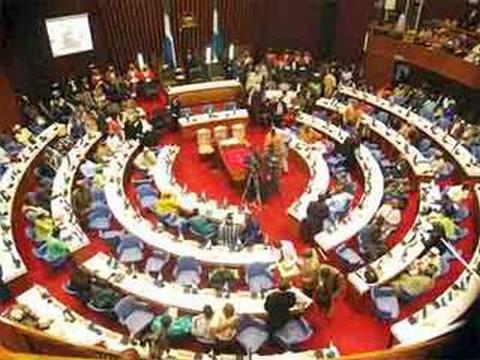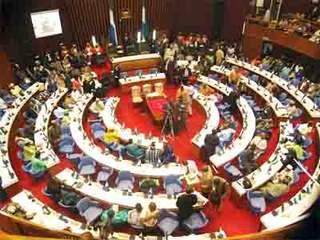By Tanu Jalloh
During a recent week-long oversight outreach the parliamentary accounts committee encouraged local councils to improve on their revenue generating strategies for sustainable governance and improved service delivery.
The apparent fear of systems failure, stemming from some outstanding queries put forward by the Auditor General’s Report of 2014, was that these local governance structures risked dissolution instead of devolution. If this happens, it might negatively affect local economic development.
Chairman of the committee and Deputy Speaker in Parliament, Hon. Chernor Ramadan Maju Bah, had cautioned representatives, administrators and authorities involved with local revenue generation ahead of any such extreme measure.
“They …either raise the needed revenues to run their affairs or risk recommendation to the Government of Sierra Leone (GoSL) and the donor partners for closure”, he warned.
Meanwhile, civil society bodies had encouraged and asked that local revenue generation be coordinated and streamlined into existing annual development plans for budget execution processes.
The National Advocacy Coalition on Extractives (NACE) had gone ahead to develop a manual that could boost local council efforts at becoming viable through local economic development around natural resource extraction.
With support from the Open Society Initiative for West Africa (OSIWA), NACE’s Coordinator, Cecilia Mattia, said they had held several local economic development training for trainers in the southern part of the country. The exercises, spanning over a year, culminated into the production of a facilitators’ guide.
The manual, they said, would guide NACE and partners, city and district councils in the Southern region of Sierra Leone to facilitate interactions between local authorities and citizens with a view to improving public services and building more viable and resilient local economies. It presents a basket of tools and approaches and how these can be used towards promoting participatory development at the local level.
Other partner members involved with the development of the development guide are the ministry of local government secretariat, the OSIWA, the Integrated Social Development Centre and local councils, especially those in the southern districts of the country.
During the launch of the guidebook at the Bo City hall, the southern district headquarter town, Bishop Akolgo, a Ghanaian social development expert, who led the training of dozens of trainers on that day, said the campaign, led by NACE and partners, would “provide tools and approaches for people-centred development especially moving local authorities away from their traditional mode to a more proactive participatory endeavour”.
He had earlier been contracted to develop the manual based on information around the workings of local government administration and development based on viable resource mobilisation.
At the press conference, following the unveiling of the manual, the consultant said efficiency was needed to make structures work.
“This mode ensures that councils are better placed to play their role as efficient and effective public services providers, facilitate the provision of private goods and services, promote local economic development, mobilise and invest in ways that reduce leakages and enhance local economy and mobilise citizens to maximise their natural resource endowment while reducing the risks towards building and sustaining resilient economies,” he said.
Chair of the coalition and head of Campaign for Good Governance, Valnora Edwin, explained the need for the document and said it would help participants and the public take ownership of council led developments.
“Council mobilise resources and they deal with the extractives sector players. We hope the training manual will help participants understand those processes and take ownership by engaging, contributing and taking decisions around their own development,” she said.
At an opening of the training of trainers’ workshop for councils in the southern province in Bo, Deputy Mayor of the Bo City Council, Mohamed Wurie Jalloh, agreed that there was need for those kinds of partnerships.
“We hope this will help solve the problems we often encounter with companies in the extractives sector”, he said, adding that the council and people were looking forward to benefitting from the content of the manual and training being done by NACE to make local administrations very efficient and accountable.
Some of those who had been trained and empowered to roll out the manual observed that developments were likely to fail when they were not owned and led by the people.
A participant from Bonthe said the area had a huge potential for local revenue generation but was still poor and the least developed. He said they had engaged the Mayor to see how the tourism sector could be harnessed for resource mobilisation.
“We even wrote a proposal around major tourist attraction sites, one of them being the history behind of and visit to the grave of Sengbe Pieh. We have still not agreed on the story of where exactly he was buried and that should be established and decorated for touristic purpose,” he said.
Amara Tucker from Jimmy Bagbo referred to a project “that was implemented by the local administration in which a structure to house commercial bike riders in the park was erected without consulting the beneficiaries. The place was abandoned”. He added that the initiative would have been redirected if the process had involved the people and the beneficiaries.
Civil society groups and participants, drawn from diverse sectors of the districts in the region, said three years after the manual would have been in use they expected to see improved agency coordination and networking, improved government tax obligations, clear channels of communication, and most importantly local councils would have been more proactive in mobilising domestic revenues for sustainable development.
© Politico 12/08/16










